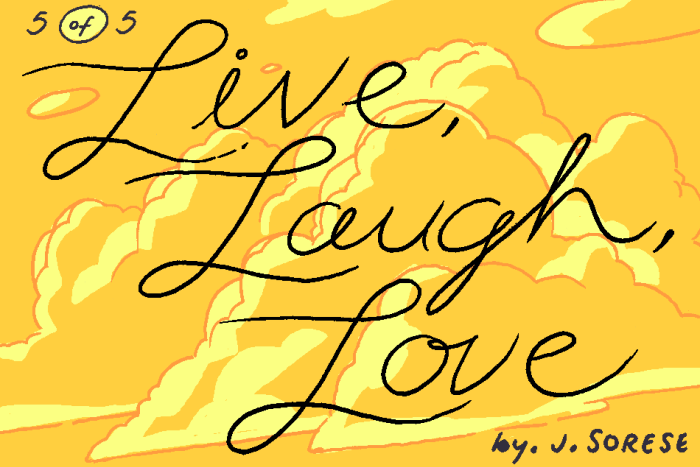A lack of romantic sentiment probably runs in my family. Here is how my grandfather proposed to my grandmother: “There comes a time in a man's life when he must get hitched.” Here is how my mother proposed to my father: “I told my parents we were getting married.”
Here is how my ex-husband proposed to me: he didn't. Here is how I proposed: I don't know. I am pretty sure getting engaged was my idea, and I think that at first he didn't want to and then after a while he didn't not want to. Then we made plans. That's all.
But that's the way I wanted it. That's the kind of couple we were. On Valentine's Day we would get a box of candy and split it; what was the point of buying two? I would have been mortified by flowers or love notes or public displays of affection. A boy with a crush had written me sonnets in grad school once, good sonnets that he printed in Elizabethan font with the long S and everything, and I had been a little flattered but also flustered and horrified and repulsed. I did not want, or need, to be told that I was lovable, that I was desirable, that I was beautiful. I couldn't imagine wishing for such things, and I certainly couldn't imagine asking for them. The idea of someone devoting time, attention, energy, or money to making me happy made me profoundly uncomfortable.
I was, in short, that Holy Grail of girlfriends: I was Low-Maintenance.
***
To desire effort from a man, we are taught, is to transgress in several ways. (This is true even if you've never had or wanted a romantic relationship with a man.) First, it means acknowledging that there are things you want beyond what he's already provided—a blow to his self-concept. This is called “expecting him to read your mind,” and we're often scolded for it; better, we learn, to pretend that whatever he's willing to give us is what we were after anyway.
Second, and greater, it means acknowledging that there are things you want. For a woman who has learned to make herself physically and emotionally small, to live literally and figuratively on scraps, admitting that you have an appetite is a source of cavernous fear. Women are often on a diet of the body, but we are always on a diet of the heart.
The low-maintenance woman, the ideal woman, has no appetite. This is not to say that she refuses food, sex, romance, emotional effort; to refuse is petulant, which is ironically more demanding. The woman without appetite politely finishes what's on her plate, and declines seconds. She is satisfied and satisfiable.
The secret to satiation, to satisfaction, was not to meet or even acknowledge your needs, but to curtail them. We learn the same lesson about our emotional hunger: Want less, and you will always have enough.
A man's appetite can be hearty, but a woman with an appetite is always voracious: her hunger always overreaches, because it is not supposed to exist. If she wants food, she is a glutton. If she wants sex, she is a slut. If she wants emotional care-taking, she is a high-maintenance bitch or, worse, an “attention whore”: an amalgam of sex-hunger and care-hunger, greedy not only to be fucked and paid but, most unforgivably of all, to be noticed.
“In the past couple of years, the 'attention-seeking' label has become an all-purpose way to gaslight feminists, silence those who demand restitution for a specific wrong, and shame women for the way they present their bodies and selves in public,” writes Rebecca Onion in Slate. But underlying the attention-seeker's supposed sin is the eminently reasonable craving to be seen, considered, and taken seriously. “The desire to be known—to be paid mind—is profoundly human,” Onion writes. It becomes “whorish” (itself a word designed to shame the concupiscent woman) only in a context where any hunger, no matter how mundane, is considered outrageous.
The attention whore is every low-maintenance woman's dark mirror: the void of hunger we fear is hiding beneath our calculated restraint. It doesn't take much to be considered an attention whore; any manifestation of that deeply natural need to be noticed and attended to is enough. You don't have to be secretly needy to worry. You just have to be secretly human.
As a child, on an endless restrictive regimen that started when I was four, I was told “if you get used to eating less, you'll stop being so hungry.” The secret to satiation, to satisfaction, was not to meet or even acknowledge your needs, but to curtail them. We learn the same lesson about our emotional hunger: Want less, and you will always have enough.
***
Do I even have to tell you that I had a weird relationship to food when I was young? I'm female, Western, relatively privileged, and incidentally a medium-amount fat. I didn't have any particular off-the-rack eating disorder, nothing severe enough to be clinical; I just threw up a lot, and skipped some meals, and frequently avoided eating in public, and mainlined junk food in private, and had all kinds of crypto-diet food weirdnesses that I filed under “picky eating.” I simply didn't like avocados, or fish, or condiments, or spicy food, or any dish with more than three components.
The primary effect was that I lost the ability to tell when I was hungry. Having yoked the act of eating—or not eating—to things like social standing and personal worth, I had unlinked it from the needs of my actual body. I didn't know how to recognize that I needed to eat, or make the necessary provisions; sometimes I wouldn't realize it until the point of meltdown. More than once, I spent months plagued by mysterious stomach pains that turned out to have been hunger pangs.
Rediscovering hunger took concerted effort—effort that, honestly, still only works when I'm concentrating. When I'm not, I'll frequently leave out eating for most of the day, then make myself sick because my disastrously belated lunchtime runs up too close to my socially-mandated dinner. Sometimes, hunger doesn't even kick in until someone puts food in front of me. I will rely on any other cue—the ease or difficulty of procuring food, the time of day, what other people are doing, the timing of my work and gym and social plans—before I'll remember to look inward. Imagine being told that your biggest secret—your weirdest sexual fantasy, your most embarrassing faceplant, your favorite Nickelback song—was supposed to dictate your behavior, publicly, as many as three times a day.
When I said “I don't like romance,” it was the equivalent of a dieter insisting she just doesn't want dessert. I did want it—I just thought I wasn't allowed.
People frequently claim that eating disorders, like anything common to adolescent girls, are just “a cry for attention.” As someone who was once an adolescent girl, I suspect they are at least partially the opposite: a cry against hunger and need, an attempt to kick away that profoundly human desire to be paid mind. To shut the door on the void.
Fearing hunger, fearing the loss of control that tips hunger into voraciousness, means fearing asking for anything: nourishment, attention, kindness, consideration, respect. Love, of course, and the manifestations of love. It means being so unwilling to seem “high-maintenance” that we pretend we do not need to be maintained. And eventually, it means losing the ability to recognize what it takes to maintain a self, a heart, a life.
So when I said “I don't like romance,” it was the equivalent of a dieter insisting she just doesn't want dessert. I did want it—I just thought I wasn't allowed.
***
I believe that there are people who truly dislike romantic gestures, in the same way that there are people who truly dislike sweets. And it's certainly true that a lot of what passes for “romance” in our broad cultural definition—the Jumbotron proposal, the bed covered in rose petals—has been neatly split from genuine emotion, like a painted eggshell blown clear of its guts. It's a charade of romance, a mask we give straight men to wear when they're frightened or confused by showing their naked face. I truly did not want that, and I still don't, and I never will. Being dragooned into acting as a partner in these romantic pageants is like having one of those dreams where you're hauled up unprepared on stage.
But attentiveness, consideration, compliments, small and large kindnesses, feeling truly loved, having someone put you first while you put them first because you're in cahoots to make each other's lives easier and better: most people do like that, when it's thoughtful and sincere. It's here, more than in the big gestures, that romance lives: in being actively caring and thoughtful, in a way that is reciprocal but not transactional.
And yet, for most of my life, I never would have asked for or expected such a thing. Many women wouldn't, even the ones who secretly or not-so-secretly pine to be treated like a princess. It's one thing to fantasize about a perfect proposal or an expensive gift; that's high-maintenance, sure, but it's also par for the course. It's asking something from a man, but primarily it's asking him to step into an already-choreographed mating dance. But asking to be thought of, understood, prioritized: this is a request so deep it is almost unfathomable. It's a voracious request, the demand of the attention whore.
Women talk ourselves into needing less, because we're not supposed to want more—or because we know we won't get more, and we don't want to feel unsatisfied. We reduce our needs for food, for space, for respect, for help, for love and affection, for being noticed, according to what we think we're allowed to have. Sometimes we tell ourselves that we can live without it, even that we don't want it. But it's not that we don't want more. It's that we don't want to be seen asking for it. And when it comes to romance, women always, always need to ask.
***
There's a YouTube video I'm fond of that shows a baby named Madison being given cake for the first time. The maniacal shine in her eyes when she first tastes chocolate icing is transcendent, a combination of “where has this been all my life” and “how dare you keep this from me?” Jaw still dropped in shock, she slowly tips the cake up towards her face and plunges in mouth-first. Periodically, as she comes up for air, she shoots the camera a look that is almost anguished. Can you believe this exists? her face says. Why can't I get it all in my mouth at once?
This video makes me laugh uproariously, but it's that throat-full-of-needles laugh that, on a more hormonal day, might be a sob. The raw, unashamed carnality of this baby going to town on a cake is like a glimpse into a better, hungrier world. This may be one of the last times Madison is allowed to express that kind of appetite, that kind of greed. She's still young enough for it to be cute.
This is Madison's first birthday. By the time she's 10, there's an 80 percent chance she'll have been on a diet. By high school, she's likely to have shied away from expressing public opinions; she'll speak up less in class, bite back objections and frustrations, shrug more, stay silent, look at the ground. She'll worry about seeming “good”—which means not too pushy, not too demanding, not too loud. (Only bitches want better. Only sluts want more.) Boys will treat her shoddily, and she will find ways to shrink herself into the cracks they leave for her. She will learn to assert less, to demand less, to desire less. She won't grab for anything with both hands; she won't tip anything towards her face and plunge in. And that transcendent anguish, that stark gluttony ... well, at least we'll have it caught on video.
What would it take to feel safe being voracious? What would it take to realize that your desires are not monstrous, but human?
Imagine being Madison, grown up but undimmed. Imagine being the woman who is unabashed about needing food to survive and pleasure to be fulfilled and care to be happy. Imagine prying open the Pandora's box where you hide your voraciousness, and letting it consume indiscriminately, and realizing that the world is not destroyed. Imagine saddling up the seven-headed beast of your hunger and riding it to Babylon.
What would it take to feel safe being voracious? What would it take to realize that your desires are not monstrous, but human?
***
What helped for me, in the last few years, is that I became adored. This was extremely unfamiliar; I'd always been the one doing the adoring, when there was adoring being done, and when there wasn't I relished the chance to relax. Taking on the full burden of adoration for a given relationship is an exhausting job. I have had entire relationships, long relationships, fueled by pure relief that I didn't have to adore someone anymore.
It certainly wasn't something that existed in my marriage—although really, whose fault was that? Being too low-maintenance, carving yourself hollow to make space for someone who never asked you to, is not actually a generous way to live. You become so obsessed with giving ground that you forget to show up—you're just a walking, talking “I dunno, what do you want to do?” Don't get me wrong: I've known men who would see me curled up small on the extreme margin of the relationship and complain that I was breathing too loud. But once you get settled in there, clinging to the edge, you can't really blame a trusting person for assuming that's the space you need. Possibly I wasn't adored in my previous partnerships because I was barely there at all.
My first experience being adored was with someone who didn't actually know me very well. I was freshly out of a marriage that had been companionable but not fulfilling, and he was desperate to have some kind of connection and commitment, with anyone. It's hard to say, now, how much I actually believed we were in love; the best I can do is “sort of, but not really, but sort of really.” But it became clear very quickly that we were not—that we were each in love with a bodiless something, to which we had given the other's face.
Still, for a fragile moment, before I realized that he barely even knew me, I was adored. And contrary to expectation, I found I had a taste for the stuff. I knew I didn't want any more from him; he was adoring someone else, someone imaginary, and his love would never quite fit me. His love, in fact, had swiftly turned garish and embarrassing, exactly the way I'd always thought romance would. I was right the first time, I complained to friends. I should have stuck with the guy who just took for granted that I didn't need anything. But even if I could have gone back, I couldn't go back.
Being adored did a curious thing for me: it made me feel important. As important, even, as a man. Instead of expecting me to downplay my hungers, there was someone trying to fill up my plate. I'm sure it doesn't work this way for everyone, but for me, having someone treat me with care—after decades of professing that I didn't even want to be cared for—showed up my dislike of romance for the self-protective fiction it was. It felt impossible to start pushing the plate away again.
Getting validation from someone else isn't a good way to stop being ashamed of your hunger. For one thing, it's not available to everyone, often for totally arbitrary reasons, and it's unpredictable and external and generally sort of a lazy shortcut to empowerment. I'm just telling you what worked for me—maybe the only thing that would have worked for me. I hope you're stronger and better. I hope you can rediscover emotional hunger the way I rediscovered physical hunger: consciously, concertedly. I hope it sticks better. I hope it lasts.
***
When my current partner and I had been dating for a month, he sent me a pie. He'd accompanied his family on vacation to Key West, Florida, and texted me many pictures of polydactyl cats and chickens and cocktails and key lime pie. I was in bed with the flu, and found this vicarious vacation sustainingly cheering, especially coming from him; the fact that he dubbed one particularly daunting dessert “Mt. Keylimeanjaro” helped cement my sense that this was the guy for me. On his last day, he texted me: “Would you be freaked out if I got you a souvenir from Key West?” “Ooooh,” I joked, “is it pie”? Shortly after he got home a key lime pie arrived at my apartment, packed in dry ice.
“I feel like I should be creeped out, in a way?” I wrote to a friend. “Because we are strenuously trying not to do anything serious, but also we talk all the time and he sent me a pie.” In general, I was worried—or, more accurately, worried that I should worry—that he was more into me than I was into him. He seemed too attentive, too affectionate, too committal in action even though we both staunchly maintained our independence in words. Who sends a whole pie just to say “thinking of you”?
In the past I had always squirmed and wilted under any gaze that seemed too admiring. I once literally broke up with a guy for seeming to like me too much. But this time, for the first time, I understood that what I'd always thought of as equal emotional investment was actually desperately skewed.
I've never sent a man a pie, granted, but I have knitted scarves, bought lingerie, left notes, cleaned apartments, done crafts, given zillions of backrubs. When I care about someone, I naturally wind up doing nice things for them, things I've noticed or guessed that they would like. And while it would be churlish and false of me to say these gestures were never returned, it's certainly true that I never expected such treatment. That if asked, I would have said I didn't want it.
Sometimes, it's only when somebody puts food in front of you that you realize you were hungry after all.






